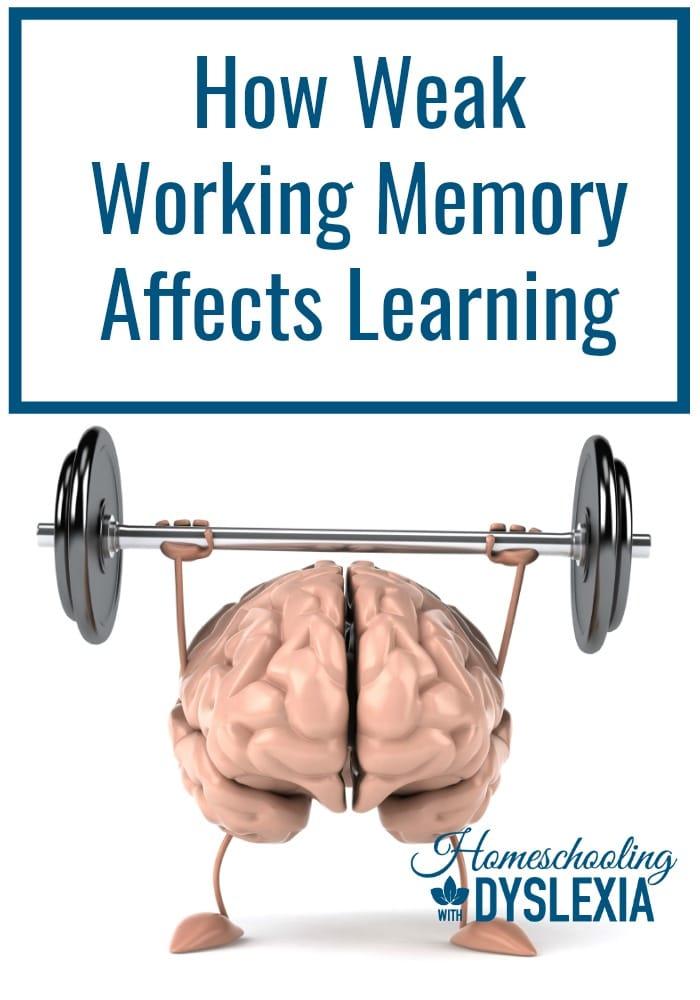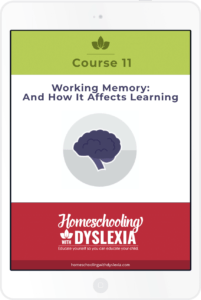Do you have a child who fails to follow directions despite repeated instruction, has difficulty staying on task, has a poor attention to detail, or often looses track of their belongings? Weak working memory may be at the root of their struggles.

What is Working Memory?
Working memory is an executive function that plays a major role in how we process, use, and remember information on a daily basis. Remembering a phone number, recalling directions, remembering how to use grammar or spell, writing an essay and applying mathematical formulas are all mental tasks that use working memory.
It’s keeping in mind anything you need to keep in mind while you’re doing something.” Whereas long-term memories stay with us even when we’re not thinking of them, working memory is an active process — a mental scratchpad where we hold and process information we need to access to complete a particular mental task.
Working memory is often referred to as being like your brain’s task list or sticky notes. As information is coming into your brain, you are both processing it and, simultaneously, storing it. It’s necessary to learn, reason, and remember.
Signs of Working Memory Weakness
Kids with working memory weakness may:
- Have difficulty remembering facts and procedures, such as new vocabulary words or mathematical procedures
- Have slow retrieval of information
- Fail to follow directions despite repeated instruction
- Demonstrate poor attention to detail, such as beginning to write a sentence and then struggling to remember all of the words in the sentence, skipping words within sentences, and writing shorter sentences (to reduce demands on working memory)
- Make place-keeping errors such as losing track of steps completed or steps yet to be completed and either repeats steps needlessly or constantly has to start over which can result in
- Abandoning tasks midway through
- Have difficulty starting work
- Have difficulty staying on task
- Lose track of belongings
These difficulties have an impact on both day-to-day life skills as well as on core academic skills of reading, writing and math.
Weak Working Memory Can Look Like Disobedience
One of the challenges kids with working memory issues face, is that their forgetfulness can easily be misinterpreted as bad behavior. When they repeatedly fail to follow what appears to be simple instructions, they can seem to be unmotivated or even oppositional which can lead problems with teachers and parents as well as accusations of not trying hard enough.
Working Memory and Dyslexia
Everyone struggles with the limits of working memory sometimes — forgetting an item from a shopping list, or drawing a blank when you’re trying to remember the rules of a new game.
But for kids with actual learning disabilities, working memory is often a more significant problem.
Kids with learning struggles often overload their working memory capacity because they are adjusting for the additional difficulties that come with their particular learning disability — like dyslexia, or processing issues.
Because they need to consciously break down and perform processes that other kids do automatically, a large amount of their “cognitive workspace” is occupied.
For example:
• If a child has auditory processing issues, she has to work much harder to listen, recall and apply what’s being said in class.
• A child with a dyslexia has to actively work to accurately interpret sounds and letter patterns in words, while remembering each word read previously.
This extra work means more clutter on the “table,” which leaves less space for new information and often translates to a slower processing speed overall.

How to Help Kids With Working Memory Weakness
An increased awareness of the negative impact of working memory difficulties on kids, has increased demands for targeted interventions in recent years.
There are currently 2 approaches:
- Help kids reduce their memory load by adapting their environment. Providing accommodations and implementing the use of assistive technology are two ways to do this.
- Targeting and training working memory function directly through brain training programs.
Helpful Accommodations for Weak Working Memory
- Reduce the student’s working memory load by breaking tasks into smaller chunks and providing written instructions.
- Encourage memory aids such as graphic organizers, and efficient lists.
- Color-code information when introducing new information, use highlighters and sticky notes.
- Create consistent routines, systems, and strategies.
- Using a variety of targeted assistive technology apps and programs such as note-taking apps, speech-to-text programs, and online organizers.
Strategies to Enhance Memory
Mnemonics is a strategy used as a memory aid with the use of acronyms, acrostics, or rhyming for the purpose of remembering a more sophisticated sequence. An example of an acronym is the use of HOMES to remember the great lakes (Huron, Ontario, Michigan, Erie, and Superior), which takes away the need to remember each lake separately. Another example is the use of BEDMAS to remember the order of operations in mathematics (Brackets, Exponents, Division, Multiplication, Addition, and Subtraction).
Self Monitoring helps a learner analyze what they learned, how they know they learned it, and how else they can use what they have learned. This brings their learning to a metacognitive level, which means the learner is very aware of what they are learning, how they are learning it and how they can use it or need to change it to be effective in new situations.
Cheat sheets or “think sheets” are used to support memory of students during all stages of the writing process (planning, organizing, writing, editing, and revising). These sheets provide memory prompts for students during each stage of the writing process and can gradually be eliminated as the student internalizes the processes. “Think sheets” can be used for remembering mathematical procedures or any other activity that requires any kind of process.
There is a lot to know about working memory weaknesses. Start by getting to know the signs in your children, providing targeted ways to reduce their memory load, and strategies for building memory.
Learn More About Working Memory and Learning
In this online parent course you will learn:
- What working memory is
- What working memory weaknesses are and how they affect learning
- How working memory develops
- What causes working memory weakness (and what doesn’t)
- Signs of working memory weakness
- The connection between low working memory and other learning struggles like ADHD, dyslexia, and processing disorders
- How working memory affects learning
- How to test for working memory ability
- How to help kids with working memory weaknesses
- Accommodations that help with weak working memory
- Assistive technology for working memory
- Strategies for boosting memory and encouraging deeper understanding
Visit our Course Page for more information or our Shop to purchase.







This is a great article that really hits home. Sadly I have not done enough to help my middle school girls who both struggle with this issue along with their dyslexia. Can you recommend or explain further a few things you mentioned? Brain training programs and think sheets? Would love to know more about these. Thanks!
I’ll be writing about both of those things soon!
Thank you so much! We deal with these struggles every day and can’t wait for your follow up!
Excellent information and validating for parents to read. Thank you
I would love to know where you got your information. Are there any references you used to write this article? A printable version would be great too!
I am glad I found you and your fantastic website and face book, thank you so much for providing such important information. As a dyslexic person myself and now one of my children also is dyslexic your descriptions and explanations of all the challenges, and frustrations that a dyslexic person has to struggle with is so true and also the reasons of why a dyslexic person reacts the way they do is very comforting. When I went through school up to graduating from university no one knew what dyslexia is and I always had to find a way to teach myself how manage my time and recall information, I was exhausted after each test. and reading this page reminded me that somehow I discovered if I used different colors marker it helped me to memorize better. I discovered if I rhym and read out loud several times my time tables I could memorize them. I always used acronym for memorizing test materials. I always wish if I given more time to finish my test which they never did and I struggle finishing the test material because I could not read as fast as others. However being dyslexic I always found some ways to find a workaround or solution for my dyslexia challenges. Your information is a great guide for me to help my dear dyslexic child. Thank you.
I love your attitude Morgan! You developed what people call a growth mindset which is why you were able to overcome so many obstacles. 🙂 Thanks for sharing and for your kind words.
“often looses track of their belongings”
You spelled ‘loses’ wrong.
Thank you for this. I never new this exist until today. I myself is still struggling with memory and brain weakness after covid-19 8n 202. My son had to drop out of school because he was struggling so much. It made him so depressed. I knew something is wrong, but I just did not know what to call it. Now I do…I ask my son everyday, why are you so disobedient. I want to learn more about brain weakness and how to improve it for both of us. My son will atleast be able to resume his studies and be happier.